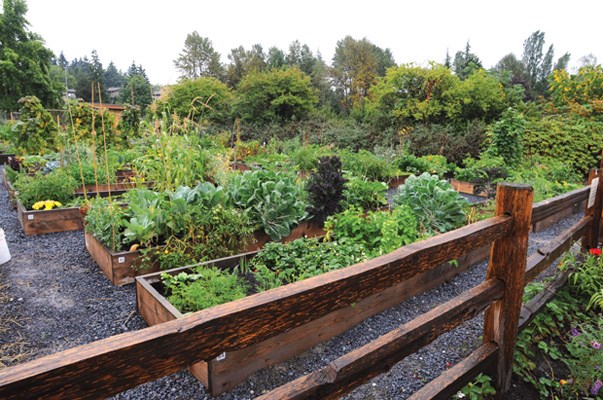IT was a first for the District of North Vancouver and another successful garden opening in an ever-growing list of community projects for the Edible Garden Project and its manager Heather Johnstone, when the Lillooet Park Community Garden opened recently.
Located north of the Holiday Inn, off Lillooet Road, the garden was built using almost all volunteer labour, except for construction of fencing by a contractor and a waterline installed by the district. With generous donations from community partners, the Lillooet community garden is now a reality and a functioning garden with 46 plots and waiting list of 30 people.
I spoke to the garden's co-ordinator, Magdalena Kozlowska, who also works as a gardener at Park & Tilford Gardens, to ask why she thinks community gardens are important. Kozlowska told me that, "Community gardens like this one allow residents who don't have the space to garden, a place to grow food, to teach their children about the importance of soil, plants and growing food. It also builds a sense of community through daily interaction at the garden and it provides people with a connection to the earth through contact with the soil and by growing plants."
Connection to the earth is definitely important since many children living in cities think food comes from the grocery store without understanding where or how food is grown.
During his opening ceremony speech, District of North Vancouver Mayor Richard Walton spoke about "the opportuntiy to build community" and "enhancing social values" through the creation of gardens like the Lillooet community garden.
I asked District of North Vancouver Coun. Robin Hicks, who was also in attendance, why society should be building projects like this. "It's the right thing to do." he said. Hicks went on to say that seeing the Lillooet garden reminded him of his grandparents' garden allotments during the Second World War, where they grew much of the food their family needed to survive the war.
Hicks said, "Food was always expensive and in short supply during the war. So my family, like most others, grew food in community allotment gardens." Hicks told me that the district has a fund set up to provide seed money or matching funds for groups wanting to start a community garden in their neighbourhood. Hicks went on to say, "But don't just come asking for money.
Come prepared with a proposal and some detail for council to review so we can make an informed decision." I asked Hicks: Is the garden legally protected through zoning or park dedication? He told me that the garden has a renewable lease with the district.
In my mind, the humble champion of the day was Heather Johnstone who has worked tirelessly for six years - many of those years with little or no pay - growing the Edible Garden Project into a force to be reckoned with on the North Shore as she and her community partners implement initiatives and open community gardens across the shore, direct surplus food to families in need and enhance the community's sense of self.
The garden project's community partners include the Pantry Restaurants, Vancity, Vancouver Coastal Health, TD Friends of the Environment Foundation, Neptune Terminals, Concert Properties, Fulbright Canada, The Great Canadian Landscaping Co., Mountain Equipment Co-Op, Park & Tilford Framing and Art, Whole Foods Market, Active Turf Irrigation, Starbucks, HomeStyles, John Henry Bikes, Rona, the District of North Vancouver and the City of North Vancouver to name a few. But Johnstone's cause could always use more partners to help share the financial cost of starting new initiatives, and maybe to pay her fairly for the good work she does.
I asked Johnstone: What are some of the benefits of growing community gardens? She told me, "The value goes beyond the environmental protection benefit and the tangible benefit of growing food. It's much more than just those two things. These gardens provide people with a place to meet and be neighbours, a place to grow friendships and share the experience of growing food. It's also a safe, healthy place to spend time with children and to teach children about the importance of plants and soil to people." I could see that Johnstone is looking ahead into the future of cities and food security when she told me, "It's the kids who will protect the land in the future so we had better teach them how to do it now."
I still believe that municipalities should require all new highdensity-developments to include a community garden as part of the development permit application, so residents can have the opportuntiy to grow food, friendships and social values in a garden located close to home. As Heather Johnstone said, "It takes a group of people to start and grow a community garden, not just one person."
Todd Major is a journeyman horticulturist, garden designer, writer, consultant and organic advocate. For advice contact him at [email protected].



